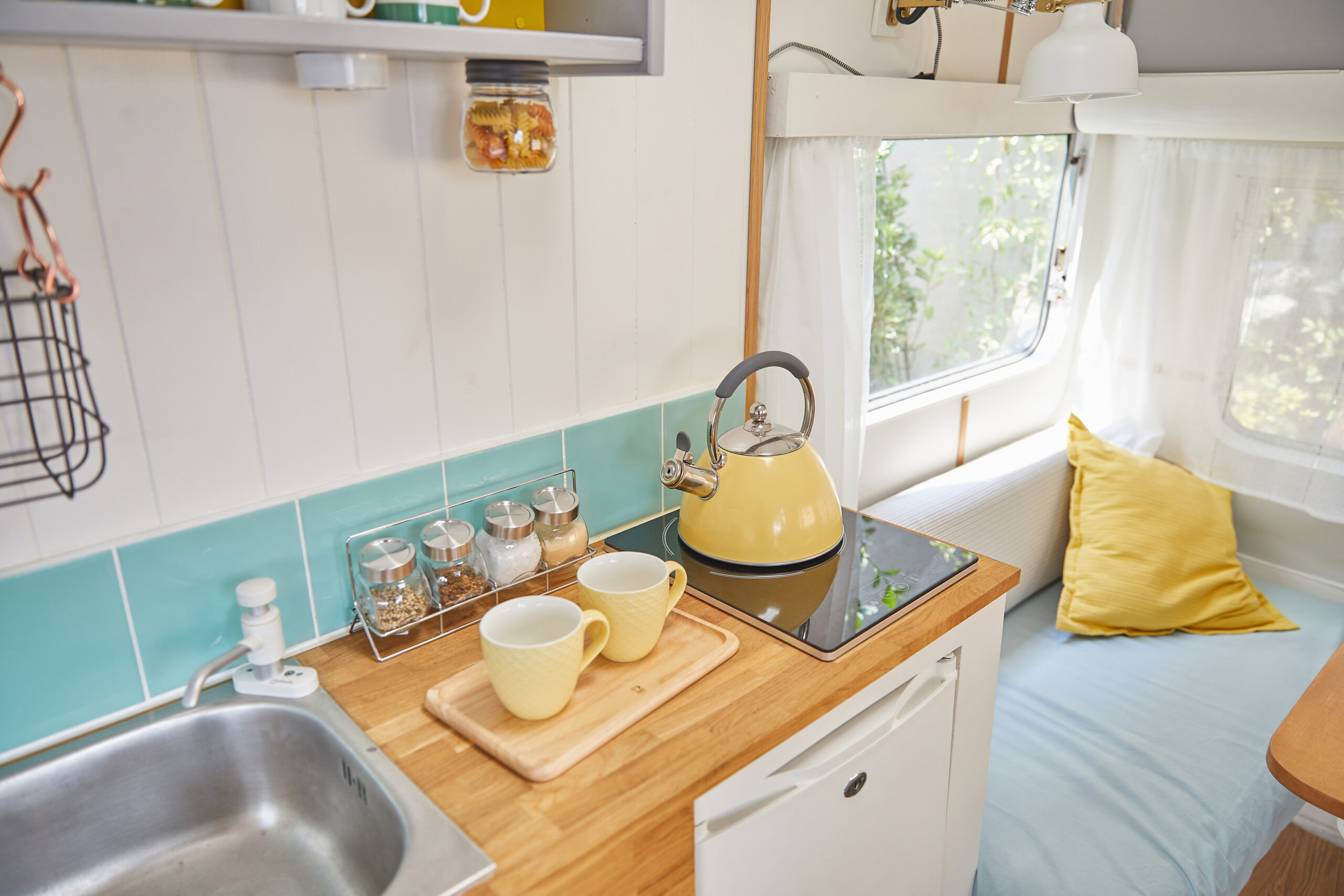
What Is The Best Lightweight Countertop Material For RV Builds?
Building or renovating an RV is no easy task, but it does give you the freedom to choose which materials to incorporate into the vehicle. Countertops are essential for every RV kitchen because they provide space for cooking and storage. When builders need to select their materials, they often struggle to find a lightweight countertop material for RV kitchens.
Plastic laminate countertops and those made from light wood (such as plywood) are good options for RV countertops. These are durable and lightweight materials that can withstand the wear and tear of everyday use. Stainless steel is a more expensive option, but it’s still strong and fairly light.
A good countertop needs to be sturdy enough to withstand damage from nicks, scratches, and burns, but it also needs to be light enough to incorporate into your RV without adding too much weight. The materials listed above are good options, but let’s explore more details about them below, as well as a few countertops to avoid.
Best lightweight countertop materials
Plastic laminate
Plastic laminate has been a popular option for countertops for a long time. There are several options available and some even come with antibacterial or anti-fungal properties. Your plastic laminate of choice needs to be attached to a base to be effective, so this should be used in conjunction with another material such as wood or metal.
Plastic laminates are lightweight sheets with adhesive on one side. Owners can place these sheets over their counters and smooth them out to create an extra layer of protection. This material is lightweight, waterproof, and fairly resistant to damage (although it may not hold up against deep cuts or burns). It also comes in a variety of appearances so you can choose solid colors, faux wood, or even fake granite or marble. Manufacturers such as Corian and Formica are popular choices among RV builders.
Plywood
Plastic laminate is a good surface for counters, but what about the material underneath? Well, if you’re looking for something durable and lightweight, you could look into a plywood counter! This might not be the first material that comes to mind, but many RV owners have found that plywood is just the thing they needed for their kitchen build. It’s strong enough to support all your kitchen tools but flexible enough to travel over rough terrain without cracking.
As long as plywood is at least 3/4″ thick and has been properly stained and sealed, there’s no reason not to use it! It’s also quite cheap and easy to find, which cannot be said of many other types of wood. You can either keep the raw wood appearance as is or cover it with a plastic laminate. Overall, this is a wonderful lightweight countertop material for RV kitchens.
Stainless steel
Steel might not be the first thing that comes to mind when you think of a lightweight countertop material for RV kitchens. However, stainless steel doesn’t need to be very thick in order to be strong. You can use a fairly thin sheet for your kitchen counter without weighing down your entire vehicle. Plus, stainless steel is perfect for a more modern or industrial look, if that’s your style preference.
Unfortunately, it does smudge fairly easily, so you may need to be picky about cleaning and upkeep. It is also much more expensive than the previous two options, but if you have a big kitchen budget, this may not be a problem.
Countertop materials to avoid
If you want to install a custom countertop in your RV, you’ll need to weigh all the options. The options listed above should serve as a good lightweight countertop material for RV kitchens. It’s generally a safe bet to stay within this wheelhouse because of their reliability.
On the other hand, there are materials that are unsuitable for an RV kitchen either due to their hefty weight or lack of durability. Let’s explore some of the least compatible materials to use for an RV countertop.
Concrete
Recently, polished concrete countertops have become popular elements of home renovations and kitchen upgrades. They are fairly smooth, attractive, and extremely durable to all kinds of damage. However, if you’re looking for a lightweight option, this is not the right material for you. Concrete is extremely heavy and it will put a lot of strain on your RV build.
Stone/Mineral countertops
The same thing is true of more traditional countertop materials such as granite, marble, and quartz. These are durable and attractive materials to use in a home kitchen, but they are far too heavy to work in most RVs. Plus, there is a bit of a risk that they could crack if you are driving on difficult terrain. These countertops are expensive as well, so they aren’t a good choice for someone on a budget.
Unprotected plastic
Using large plastic slabs or tables is certainly a cost-effective way to create more countertop space, but you need to think about their durability. Plastic can easily stain if it hasn’t been treated or covered with a protective layer of some kind. It’s also fairly easy to cut into most types of plastic, so expect to see scuffs, knicks, and burn marks show up. This creates a scratchy surface that isn’t pleasant to use or look at. Plus, it creates nooks and crannies that can trap bacteria.
Ceramic tile
Ceramic tiles are a very popular choice among the DIY crowd and for good reason. These tiles are a fun way to decorate your space and express some creativity. However, they come with their own set of complications.
First of all, the individual tiles often cannot be arranged in a single uniform level, thus creating an uneven work surface. Secondly, each individual tile has the potential to break, crack, or even fall out of place. Once one thing starts to break, it will be a hassle to replace or restart the process. Tiles are fun to use for backsplash, but they aren’t a great option for a countertop material.
So generally, if durability and portability are your primary goals, your best options will usually be some type of light wood and/or a protective layer of plastic laminate. These will both serve as a lightweight countertop material for RV builds, and there are many different styles and appearances within these parameters. The kitchen of your dreams is within reach with these options!
One of the best parts about RVing is engaging with the community of traveling enthusiasts. iRV2 forums allow folks to chat with other RVers online, and get other perspectives on everything RVing, including products, destinations, RV mods, and much more.
Related articles:



